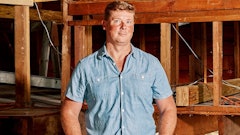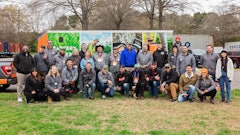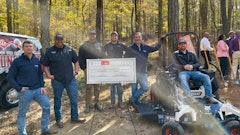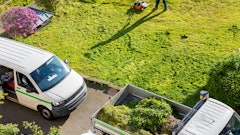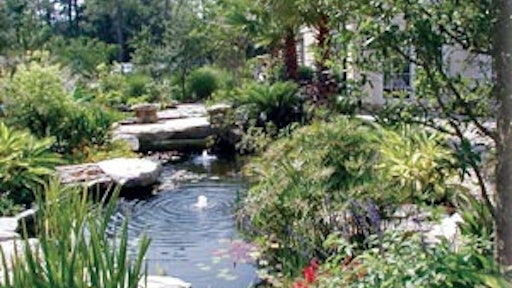
When David White retired more than a dozen years ago, he expected his career in the green industry to come to an end. He sold the successful company he’d spent 17 years building in Atlanta, and settled into life after business on Hilton Head Island, South Carolina. Little did he realize he was about to start all over again.
Cashing out and taking early retirement is the dream of many a contractor, but with his entrepreneurial instincts White says he soon became restless. “After about a year of retirement, I got bored; golfing and fishing get very old if you do them every day.”
He kept himself busy building his own home. But when his buyer in Atlanta defaulted on payments, he and his wife Carey decided to start another business from scratch. Starting with one maintenance client and doing all the work themselves, the Island Environments would soon eclipse their previous effort.
Now boasting 550 maintenance accounts and an installation division employing 80, White attributes his organization’s success to an unexpected, remarkable company culture. It has allowed him to release the reins without having to worry about where the business is headed.
“I wouldn’t have thought it possible when we started that we could grow this quickly while remaining stable, all without jeopardizing the quality we’re known for,” White says.
A rewarding challenge
The market on Hilton Head Island proved to be fertile ground for the Whites’ careful, customer-oriented approach. “High-end residential is far more challenging than any other kind of client base,” says White. “They’re personally invested in our work, because the property reflects on them, so they’re more discriminating and demanding.
“This can cause a lot of headaches, but it can create tremendous opportunity if you can meet their standards,” he adds. “We made a point of standing behind our work, and our clients rewarded us with their loyalty. We’ve even had clients who’ve moved ask us to do install work for them as far away as New York.”
With the island saturated with high-end clients, word of mouth spread quickly. The company grew at more than a 30% annual clip. And that created an inevitable strain, as the company digested more and more work while striving to maintain its high standards.
“Frankly, I wasn’t comfortable with the rate we were growing,” White explains.
All in the family (almost)
As their platoon transformed into a small army, the biggest challenge for the Whites was finding competent managers to lead the ranks. They were pleasantly surprised when their eldest son, Jason, raised his hand. In time he was followed by brothers Jeremy and Jamie. Jason has since left to start his own company. Jeremy heads landscape construction and Jamie is chief financial officer, and both are part owners.
“We were shocked they wanted to be part of the business,” says White. “They had never shown an interest, and never worked in the industry.
But they saw the opportunity and stepped right up. They learned the ropes quickly.”
In fact, the new generation soon began pressing dad to expand even more. White tells, “My wife and I were very comfortable with the size of the company when we had about 20 employees, but the boys wanted to take it to the next level.”
Soon the company dived head-first into installation with Jeremy at the helm, striving to provide the same high level of service. And in 2001, the Whites decided to buy out a local design firm and bring on its owner, David Jackson, as a principal and senior designer.
“I had always been impressed with Island Environments’ ability to interpret and implement a design,” says Jackson. “They were able to work around the inevitable problems and changes on site, yet keep in line the designer’s intent. At the same time, they were able to adapt when necessary and visualize the project through the client’s eyes, instead of just blindly putting plants, etc., precisely where the drawing said.”
On the maintenance side, the company turned to Art Redmond, who has a long history in the green industry and management. But they were also careful in making sure he meshed with the company culture.
“I think a lot of companies get tripped up by thinking experience automatically qualifies as a plus,” explains Jackson. “But if someone was trained improperly from the start and/or has developed bad habits, it can cost you more than training someone from scratch.
“It’s also a mistake to assume that experience is a substitute for ongoing education and training,” Jackson continues. “We make a concerted effort to keep everyone up to date with the latest training and technology to stay current in the marketplace. It’s an investment that pays big dividends.”
Working off the same page
Jackson says the team synergy, exemplified by the design and construction operations, is an intangible competitive advantage that’s hard to match. He says the key is taking egos out of the equation, and making client satisfaction everyone’s overriding goal.
“Any time you put more than one person in a room, you’re going to have differences of opinion, but we strive to respect each other and listen to each other. Instead of jumping down someone’s throat for not following my design, I assume there was a good reason for the change. If it makes the client happy, we all come out looking better anyway.”
Like a good rock and roll band, Jackson says that everyone understands it takes a team effort to produce a hit. “We all understand that when Jeremy has an idea, I have another and Art yet another, we usually end up combining them into something that’s better than any one of us could have come up with.”
And Jackson says that White’s laid-back management style helps foster that environment. “Dave’s the type of manager who doesn’t demand to be in on every single decision. He gives us enough rope to hang ourselves, even on a big project where there’s a lot of pressure to get things exactly right, but he’s always ready to help us get back on our feet. He understands that mistakes are part of learning and a critical part of building up managers’ confidence to take action and responsibility.
“It’s a bit scary at first, but there’s no substitute for that experience,” says Jackson, adding that the feeling of ownership and trust are a big reason why the company is able to retain supervisors.
The stability and capability of his managers, in turn, have allowed White to free himself of the company’s day-to-day concerns and focus on “big picture” issues like business development and strategy.
Staying out of the shark pond
The company has been able to develop relationships with several of the area’s preeminent, high-end builders, whose business is driven by quality, not penny-pinching or rushing jobs to completion.
Contractors must also be able to meet strict requirements imposed by the architectural review boards that govern most developments. “The boards review everything, from architectural style to the smallest detail on a landscape plan. And every board is different, both in the nuances of requirements and in personalities. If your plan gets rejected, it can put the whole property on hold for up to a month, and the builder can’t get a certificate of occupancy until the landscaping is complete. It’s a lot of pressure.”
But he says the ability to meet those high standards and perform under pressure has earned the company much relief from other, more troublesome strains.
“The builders’ clientele are very discriminating. They want the absolute best, and they’re willing to pay to get it,” says Jackson. “It’s a nice place to be, because competition on the island can get pretty cutthroat. We’re not immune from competition, but we don’t have to cut corners to get the job and put our reputation at risk. We can also be a bit choosy sometimes if we don’t think a job is a good fit for our company, and be sure that every project is something we’ll be proud to put our name on.”
Charting a slow, steady course
Island Environments has also put feelers into the rapidly expanding market along the coastline, including a former plantation just entering development that is 4/5ths as large as all of Hilton Head. “There are many new frontiers, and we’re staying on the leading edge,” says Jackson.
However, he says the company is also avoiding the temptation of overextending its capabilities and/or geographical reach. “The gut reaction is to establish a beachhead in all these new markets as a hedge for the future. But that doesn’t do us any good if we spread ourselves too thin.”
Jackson adds that conquering new territory isn’t the only option. The company has added several services at the behest of existing clients, including hardscaping. “We were kind of pulled into that reluctantly; it simplified life for our clients, but made ours more complicated,” he says. “But we dived in once we determined it was something we could do well and coordinate with our landscape packages. The demand is very high, and it’s become a good income stream for us.”
He says installing replacement landscapes is also a fast growing segment of the business. “Because of high property values, it’s often more profitable for an owner or builder to tear down the home and rebuild. It looks to be a constant regeneration of work for us on the island.”
The company established a subsidiary called Flowerscapes, with a full-time staffer who delivers and plants color year-round for high-end clients as well as special events.
White says that if such work sustains a moderate amount of growth for the company, he’ll be satisfied to put his focus on the island and on expanding “in house” services. “We’ve been very fortunate in cultivating an ideal clientele and a great team of people, many of whom have been with us since the beginning. We’re not going to jeopardize our strengths.”













